Further escalation of conflicts were bound to happen sooner or later. With war raging in Europe and India it came as little shock that other nations saw the chance to further their own ambitions. Japan had, for many years now, been aggressive in their tone towards other nations. Seeing the opportunity created by the growing chaos in the rest of the world they seized the chance, seeing Chinese disunity as a weakness to be exploited. As such, the world moved a step closer towards global war, the individual conflicts creating sparks that edged closer to the powder kegs. Katharina read the passage quickly. Karl held the book as she did. 'So, would you agree that the wars in Asia had an impact on Germany?' he asked. 'It's a tough call. What we do know is that the various conflicts emerging at this time were not directly connected. At the time that Japan declared war on Communist China, it was merely another war. Yes, this soon escalated as Japan declared war on the other Chinese factions. There are some scholars that argue there was no world war, but a series of localised conflicts, often aided by foreign powers. Many would call that a world war, however.' Katharina rubbed her chin as she answered 'It would not hurt to mention it. It certainly had an impact in terms of the Kriegsmarine at least, an argument being made by Admiral Lütjens that the German surface fleet would need as much investment as the submarine fleet had been getting...' She rummaged through books. 'Ah! Here! "It is with regret I look out at the once proud Hochseeflotte, the cruisers left to rust alongside, their crews moral low. This issue is compounded even further with the advent of the new unterseeboots, our underwater cousins seemingly receiving all the current funding. With the situation engulfing the world now, we will need to support these new vessels. As things stand, German interests outside of Europe are not being represented. This great, proud nation is marginalised and ignored. I therefore plead to the Reichstag that we invigorate the fleets. We have new technology, plans and designs that are left unused. Let us implement them. We stand ready for the reply" which he didn't have to wait long for.' She read the open letter to the Reichstag out loud. 'I don't understand, what does this have to do with Japan?' Karl asked. 'Well, that's easy. Germany followed Japan's example and looked at aircraft carriers. Though it would take some time before they came in, the Reichstag gave the Kriegsmarine approval to begin researching designs for them following Lütjens' letter.' Katharina returned to her own books. It was a tenuous link, at best, she reasoned, but sometimes that was all there was to it.
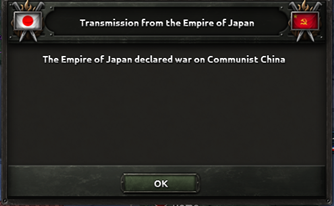
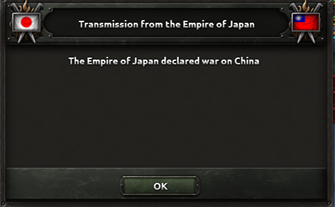
Took longer than normal...
The Soviet Union had clearly not expected the impending war. It highlighted the leadership issues suffered by the regime, nobody wanting to commit without first getting Stalin's leadership. Eventually, it was sheer manpower that won the war. Stalin was content to throw men at the problem and many, despite the harsh lifestyles they had led under the Soviet regime, were more than willing to die for the Motherland. Though the military leaders that led the rebellion had some early successes, they soon suffered from their losses, falling back bit by bit. Eventually Stalin managed to win the war, though many authors from Russia had praised the bravery of the rebels, though they were careful not to do it in Stalin's lifetime. Ultimately, instead of removing Stalin from power, the war had the effect of solidifying his hold over Russia. 'Here' Katharina passed Mikhail Zemskov's History of the Soviet Union to Karl. 'It talks about the end of the Russian Civil War and the events that followed. There's likely to be something there that can help.' Karl looked up, nodding in thanks, before returning back to the book he was engrossed in.
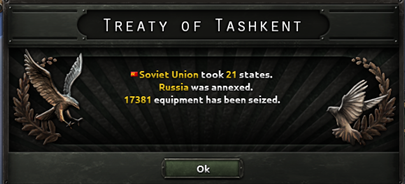
Took the Soviet Union longer than I expected.
At the war's end, Mohandas Singh said 'It is with great pleasure we announce the end of this war. India and Pakistan have always been strong neighbours and it is clear that misunderstandings in the past have harmed both great nations.' as he stood next to his Pakistani counterpart. It was clear form the recordings of the press conference following that there was still tension between them, the handshakes and smiles forced. The 'misunderstandings' that they each referred to were historical claims. Both sides had fought hard and both sides made little ground. It was not an understanding that had brought them to the table, but a lack of supplies. Pakistan had hoped to emulate the lighting warfare that was becoming more common in the European wars and instead found themselves bogged down in trench warfare similar to the First World War. That this war was rapidly descending into a war of attrition was the biggest factor in getting both sides to agree to a peace. Katharina looked at her notes. She tore the page, crumpling it before throwing it at her bin. They were good notes, but the essay was supposed to be about Germany. She looked at the blank page in front of her, sighing. She began to write once more; The war with Italy was going well. In terms of the global conflict, a surprise end to the Pakistan - India war...
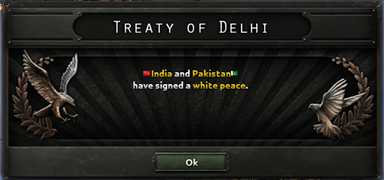
Well, that was anti-climatic...
Following victory in their own civil war, the Soviets were free to shift their focus towards expanding their influence. Pushing vast resources into the Republican forces, they were not only able to influence their victory but, in addition, exert some control over the new Spanish government. Many have attributed this to the lack of interest shown by the US following their neutrality. How this would affect European relations would remain to be seen, but by this point Germany in particular was once again speaking out against the communist threat. Still embroiled in their war in Italy, however, there was little they could do to influence things. Katharina grabbed a post-it note, placing it on the page she was reading of Monica Patrova's Spanish Civil War and the rise of communism. It was truly at this point that many believed changed the dynamic in Europe. Katharina picked up her notepad and began to write some notes. She knew Germany had felt threatened, with communists to the East and West and only Poland and France, respectively, as a buffer. She cross referenced with Antonio Valerairo who had written When the Spanish Civil War ended, further indications of German imperialist dreams manifested. Not content with their attempts to annex Italy, then saw the rise of communism as an opportunity to once again poke the Russian bear, looking to force the Soviets into being the aggressors in a war that only Germany wanted. A different perspective, she supposed, and it was unlikely the Italian would be kind in his words towards Germany.
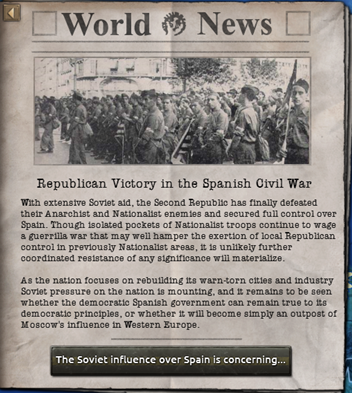
The long war in Spain is over.
'Hey, check this' Karl read aloud from his book 'There was a great deal of dissatisfaction within the Indian population. Not content with the reasons given why the war with Pakistan had to end, the people of India became split over the future of their country. Mohandas Singh struggled to maintain control over the country until, inevitably, another war broke out. Communist forces calling themselves the People's Republic of India surged from the South of the country. Once again, Germany was very vocal in their condemnation of the Soviet influence in this war, though many nations merely turned a blind eye' He finished reading, looking up at Katharina. 'I didn't realise the Soviets had so much influence over the Indian wars! The author even credits Soviet influence as to be the true cause of the earlier war with Pakistan.' Katharina stood, stretching as she did so. 'It's a good point' she replied 'though I doubt there's much evidence. My eyes are starting to blur. Shall we grab lunch? Bearing in mind we have class in-' she looked at her watch 'an hour' Karl nodded and helped her gather the books.
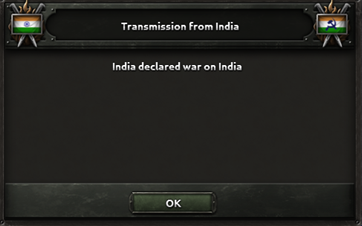
Yeah, that won't get confusing...
'I just don't understand it.' Katharina said to the lecturer. 'You say in one breath that Germany was looking at liberating the Italian people from the horrors of a fascist regime, similar to how they themselves had recently managed. Yet the terms of the peace conference were terrible! The German government took most of Italy, leaving the new democratic government as a puppet state under German control. France either took the Italian overseas territories or released them as puppet states. So how were the Italian people liberated?' The lecturer smiled before speaking. 'Yes, it is a slightly more complex issue than it is portrayed. Many believe that the subjugation of Italy was the first step of German imperial policy, but others argue that, in order to tackle the growing threat of communism, Italian resources were required and, by creating a puppet state out of what remained, they limited their future threat.' Katharina was making notes as the lecturer spoke. 'But what of the evidence at the time?' She asked. The lecturer leaned on their desk as they considered the question. 'I suppose that depends on who you wish to believe. Many Germans at the time spoke of friendship, of unifying against the Soviet threat. However, many Italians saw Germany's actions as occupation, that they had swapped one dictator for another.' She waited till Katharina had finished writing before looking around the rest of the class. 'Are there any other questions?'
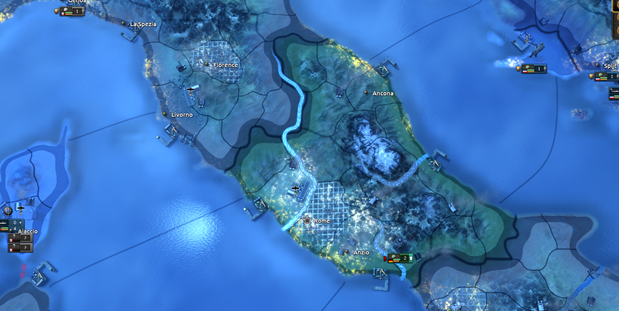
Our Italian friends


Took longer than normal...
The Soviet Union had clearly not expected the impending war. It highlighted the leadership issues suffered by the regime, nobody wanting to commit without first getting Stalin's leadership. Eventually, it was sheer manpower that won the war. Stalin was content to throw men at the problem and many, despite the harsh lifestyles they had led under the Soviet regime, were more than willing to die for the Motherland. Though the military leaders that led the rebellion had some early successes, they soon suffered from their losses, falling back bit by bit. Eventually Stalin managed to win the war, though many authors from Russia had praised the bravery of the rebels, though they were careful not to do it in Stalin's lifetime. Ultimately, instead of removing Stalin from power, the war had the effect of solidifying his hold over Russia. 'Here' Katharina passed Mikhail Zemskov's History of the Soviet Union to Karl. 'It talks about the end of the Russian Civil War and the events that followed. There's likely to be something there that can help.' Karl looked up, nodding in thanks, before returning back to the book he was engrossed in.

Took the Soviet Union longer than I expected.
At the war's end, Mohandas Singh said 'It is with great pleasure we announce the end of this war. India and Pakistan have always been strong neighbours and it is clear that misunderstandings in the past have harmed both great nations.' as he stood next to his Pakistani counterpart. It was clear form the recordings of the press conference following that there was still tension between them, the handshakes and smiles forced. The 'misunderstandings' that they each referred to were historical claims. Both sides had fought hard and both sides made little ground. It was not an understanding that had brought them to the table, but a lack of supplies. Pakistan had hoped to emulate the lighting warfare that was becoming more common in the European wars and instead found themselves bogged down in trench warfare similar to the First World War. That this war was rapidly descending into a war of attrition was the biggest factor in getting both sides to agree to a peace. Katharina looked at her notes. She tore the page, crumpling it before throwing it at her bin. They were good notes, but the essay was supposed to be about Germany. She looked at the blank page in front of her, sighing. She began to write once more; The war with Italy was going well. In terms of the global conflict, a surprise end to the Pakistan - India war...

Well, that was anti-climatic...
Following victory in their own civil war, the Soviets were free to shift their focus towards expanding their influence. Pushing vast resources into the Republican forces, they were not only able to influence their victory but, in addition, exert some control over the new Spanish government. Many have attributed this to the lack of interest shown by the US following their neutrality. How this would affect European relations would remain to be seen, but by this point Germany in particular was once again speaking out against the communist threat. Still embroiled in their war in Italy, however, there was little they could do to influence things. Katharina grabbed a post-it note, placing it on the page she was reading of Monica Patrova's Spanish Civil War and the rise of communism. It was truly at this point that many believed changed the dynamic in Europe. Katharina picked up her notepad and began to write some notes. She knew Germany had felt threatened, with communists to the East and West and only Poland and France, respectively, as a buffer. She cross referenced with Antonio Valerairo who had written When the Spanish Civil War ended, further indications of German imperialist dreams manifested. Not content with their attempts to annex Italy, then saw the rise of communism as an opportunity to once again poke the Russian bear, looking to force the Soviets into being the aggressors in a war that only Germany wanted. A different perspective, she supposed, and it was unlikely the Italian would be kind in his words towards Germany.

The long war in Spain is over.
'Hey, check this' Karl read aloud from his book 'There was a great deal of dissatisfaction within the Indian population. Not content with the reasons given why the war with Pakistan had to end, the people of India became split over the future of their country. Mohandas Singh struggled to maintain control over the country until, inevitably, another war broke out. Communist forces calling themselves the People's Republic of India surged from the South of the country. Once again, Germany was very vocal in their condemnation of the Soviet influence in this war, though many nations merely turned a blind eye' He finished reading, looking up at Katharina. 'I didn't realise the Soviets had so much influence over the Indian wars! The author even credits Soviet influence as to be the true cause of the earlier war with Pakistan.' Katharina stood, stretching as she did so. 'It's a good point' she replied 'though I doubt there's much evidence. My eyes are starting to blur. Shall we grab lunch? Bearing in mind we have class in-' she looked at her watch 'an hour' Karl nodded and helped her gather the books.

Yeah, that won't get confusing...
'I just don't understand it.' Katharina said to the lecturer. 'You say in one breath that Germany was looking at liberating the Italian people from the horrors of a fascist regime, similar to how they themselves had recently managed. Yet the terms of the peace conference were terrible! The German government took most of Italy, leaving the new democratic government as a puppet state under German control. France either took the Italian overseas territories or released them as puppet states. So how were the Italian people liberated?' The lecturer smiled before speaking. 'Yes, it is a slightly more complex issue than it is portrayed. Many believe that the subjugation of Italy was the first step of German imperial policy, but others argue that, in order to tackle the growing threat of communism, Italian resources were required and, by creating a puppet state out of what remained, they limited their future threat.' Katharina was making notes as the lecturer spoke. 'But what of the evidence at the time?' She asked. The lecturer leaned on their desk as they considered the question. 'I suppose that depends on who you wish to believe. Many Germans at the time spoke of friendship, of unifying against the Soviet threat. However, many Italians saw Germany's actions as occupation, that they had swapped one dictator for another.' She waited till Katharina had finished writing before looking around the rest of the class. 'Are there any other questions?'

Our Italian friends


















